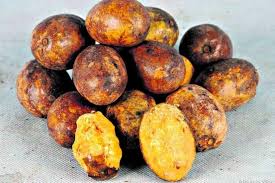Uxi Juice: Amazon's Antioxidant Powerhouse
Discover the health benefits of uxi juice from the Amazon rainforest. Packed with powerful antioxidant properties, this juice offers anti-inflammatory and immune-boosting benefits that rival Mediterranean diet staples.
JUICES
CILZA DUARTE
6/18/20256 min read


Ever found yourself drowning in olive oil propaganda while the Amazon's ancient treasures remain hidden in plain sight? Let me introduce you to something that might just make your Mediterranean diet devotees reconsider their loyalty.
I was standing in a crowded farmers market in Belém last summer, sweat beading down my temples, when I first encountered the unassuming brown fruit that would challenge everything I thought I knew about superfoods. An elderly woman with hands weathered from decades of harvesting offered me a cup of thick, yellowish liquid. "Bebe," she insisted with a knowing smile. "É uxi. Para saúde."
What followed was a revelation that sent me spiraling down a rabbit hole of Amazonian nutrition that few wellness experts outside Brazil have fully appreciated.
When Worlds Collide: Amazonian Wonder vs. Mediterranean Marvel
The Mediterranean diet has enjoyed decades in the nutritional spotlight—rightly celebrated for its heart-healthy fats, antioxidant-rich produce, and life-extending properties. We've all heard the endless praise: olive oil this, fresh fish that. (Not that there's anything wrong with either, mind you.)
But what if I told you that deep in the Amazon rainforest thrives a nutritional powerhouse that rivals—and in some ways surpasses—the much-lauded Mediterranean pantry staples?
Enter uxi juice.
This isn't just another exotic "superfood" exploited by wellness influencers. No, uxi (pronounced "oo-shee") represents something far more profound: an ancestral wisdom about nutrition and healing that predates modern nutritional science by centuries.
The fruit itself isn't much to look at. Brown, oval-shaped, and roughly the size of a small avocado, it wouldn't win any beauty contests at your local Whole Foods. But beneath its humble exterior lies a nutritional goldmine that deserves global recognition—especially when compared to the darlings of Mediterranean cuisine.
The Nutritional Face-Off You Never Knew You Needed
Let's break this down without drowning in a sea of milligrams and percentages.
Uxi juice delivers an antioxidant punch that would make blueberries blush. Rich in polyphenols and flavonoids, it neutralizes free radicals with remarkable efficiency—similar to how red wine (a Mediterranean staple) works its magic, but without the alcohol content that limits consumption.
The anti-inflammatory properties of uxi deserve special attention. While Mediterranean diets rely heavily on omega-3 fatty acids from fish and olive oil to combat inflammation, uxi approaches the problem differently. Its unique phytochemical profile targets inflammatory pathways directly, operating more like nature's ibuprofen than a preventative measure.
Wait, there's more. Uxi contains significant amounts of vitamin C—substantially more than you'd find in most Mediterranean fruits. This not only strengthens the immune system but also enhances collagen production, supporting skin health in ways that Mediterranean staples simply don't address directly.
Na verdade, pensando melhor, the comparison becomes even more interesting when we consider mineral content. While Mediterranean foods excel in providing calcium and magnesium, uxi delivers these alongside rarer trace minerals that are increasingly depleted in conventional agricultural soils.
Traditional Wisdom Meets Modern Science
"Quem não conhece o uxi não conhece a Amazônia," goes an old saying in northern Brazil—"Those who don't know uxi don't know the Amazon." This isn't just cultural pride speaking; it's the distilled wisdom of generations.
Indigenous communities throughout the Amazon basin have long valued uxi for its medicinal properties. Women particularly sought it out for reproductive health, using it to address everything from menstrual discomfort to postpartum recovery. This female-focused application stands in fascinating contrast to the relatively gender-neutral health claims of most Mediterranean foods.
But here's what modern research is beginning to confirm: uxi's benefits for urinary health are significant and measurable. Its gentle diuretic properties help flush toxins while simultaneously delivering nutrients that strengthen the urinary tract—a combination that's hard to find in a single Mediterranean food source.
I spoke with Dr. Mariana Oliveira, a nutritionist specializing in Amazonian foods at the Federal University of Pará, who explained: "What makes uxi particularly interesting is how it combines multiple beneficial compounds that work synergistically. Unlike single-nutrient supplements or even some whole foods, uxi's complex matrix of nutrients seems to enhance overall absorption and efficacy."
(I'll admit I was skeptical at first—I've heard similar claims about countless superfoods that turned out to be little more than marketing hype.)
But the evidence is compelling. Recent studies, though preliminary, suggest that regular consumption of uxi juice may help regulate blood sugar levels—addressing a health concern that's becoming increasingly prevalent worldwide, regardless of whether you follow a Mediterranean or any other dietary pattern.
From Rainforest to Your Glass: The Journey Matters
Here's something you won't find in Mediterranean diet books: the ecological impact of your nutritional choices.
The uxi fruit comes from the Endopleura uchi tree, which grows wild throughout the Amazon rainforest. Unlike olive trees that require specific climate conditions and considerable water resources, uxi trees thrive in their native ecosystem without additional inputs. They're part of the forest's natural biodiversity—not an agricultural imposition upon it.
Harvesting uxi remains largely a traditional practice. "É como o tempo parou," explains João Santos, a third-generation uxi harvester from Pará state—"It's like time stopped." Families gather fallen fruits from the forest floor, a sustainable practice that contrasts sharply with the increasingly mechanized olive harvesting methods across the Mediterranean.
This matters because nutrition isn't just about what goes into your body—it's about the entire system that brings that food to your plate or glass. The ecological footprint of uxi production is minimal compared to the extensive agricultural operations required for many Mediterranean staples.
Bringing Amazonian Wisdom to Your Wellness Routine
Now, I'm not suggesting you abandon your beloved olive oil or Mediterranean-inspired meals. That would be culinary heresy (and frankly, unnecessary). What I am proposing is an expanded nutritional horizon that incorporates wisdom from multiple traditional systems.
Here's how you might integrate uxi into your existing wellness routine:
Start your day with a small glass of uxi juice alongside your breakfast. Its robust nutrient profile provides sustained energy without the crash that follows sugary fruit juices. The taste? Imagine a complex sweetness with hints of caramel and a slightly earthy finish—nothing like the predictable citrus profiles common to Mediterranean fruits.
For those afternoon energy slumps when you might reach for espresso (very Mediterranean), consider an uxi-based smoothie instead. The natural sugars provide immediate energy while the nutritional components support sustained vitality without caffeine's eventual crash.
And for the culinary adventurous? Uxi can be incorporated into savory applications that would make any Mediterranean chef pause in consideration. Its unique flavor profile pairs surprisingly well with fresh fish (a crossover with Mediterranean cuisine) and adds depth to grain bowls that might otherwise feature tahini or hummus.
The Broader Perspective: Dietary Diversity as the Ultimate Goal
Looking beyond specific comparisons, there's a larger lesson here that nutritional science continues to affirm: dietary diversity is crucial for optimal health. The Mediterranean diet's success stems partly from its variety of whole foods—a principle that can and should extend to include beneficial foods from other traditional systems.
"Ficar na moita" is another Amazonian expression that loosely translates to "staying hidden in the bushes"—an apt description of how uxi and other rainforest nutritional treasures have remained largely unknown to global wellness conversations. But this obscurity is ending as research catches up to traditional knowledge.
The real magic happens when we stop pitting nutritional traditions against each other and start seeing them as complementary pieces of a global wellness puzzle. Mediterranean wisdom has given us the importance of healthy fats and plant-forward eating. Amazonian traditions offer insights into botanical medicine and ecological sustainability that enhance rather than contradict these principles.
A Personal Note from Someone Who's Journeyed Both Shores
Having spent years studying nutritional traditions across continents, I've developed a deep appreciation for how geography shapes our understanding of what constitutes "healthy eating." The Mediterranean diet emerged from specific environmental conditions, agricultural possibilities, and cultural practices—as did Amazonian food traditions.
What continues to amaze me is how these seemingly disparate systems often arrive at similar conclusions through different paths. Both traditions, for instance, emphasize whole foods over processed alternatives. Both recognize the importance of community in eating practices. And both acknowledge food as medicine—a concept modern nutrition is only beginning to fully embrace again.
Uxi juice represents something beyond itself: it's a gateway to appreciating nutritional wisdom that hasn't benefited from decades of research funding and global promotion. It reminds us that health solutions often exist in unexpected places, sometimes hiding in plain sight for centuries before receiving proper recognition.
The next time you reach for that bottle of Italian extra virgin olive oil or Greek yogurt, perhaps pause and consider what other traditional foods might complement your wellness journey. The Amazon's treasure trove of nutritional wisdom—with uxi as just one shining example—offers a powerful reminder that no single dietary tradition holds a monopoly on health.
After all, isn't the pursuit of wellness meant to be an adventure rather than a rigid doctrine? I'll drink (uxi juice) to that.
Visit myamazonfood.com to discover more about uxi juice and other Amazonian superfoods that can transform your approach to nutrition and wellness.
#AmazonianSuperfoods #UxiJuice #MyAmazonFood #NaturalWellness
Inspiration - Health
Explore recipes, tips, and culinary articles today.
wellness
Flavor
cilzaduarte@gmail.com
55 81 98087-8684
© 2025. All rights reserved.
